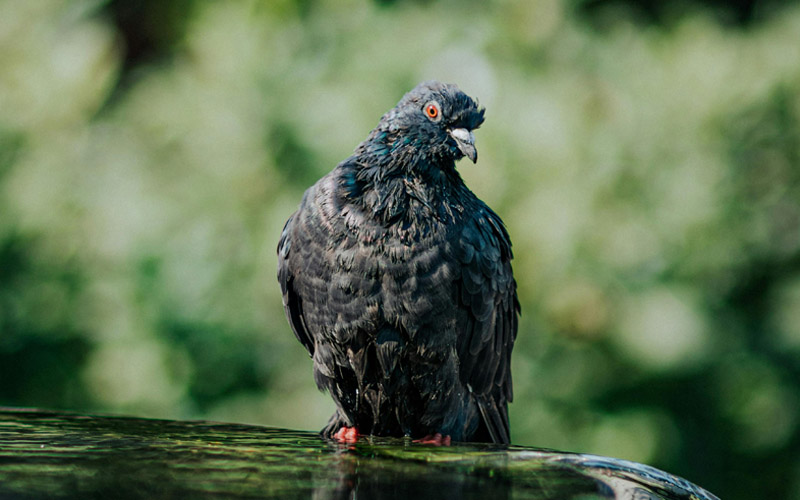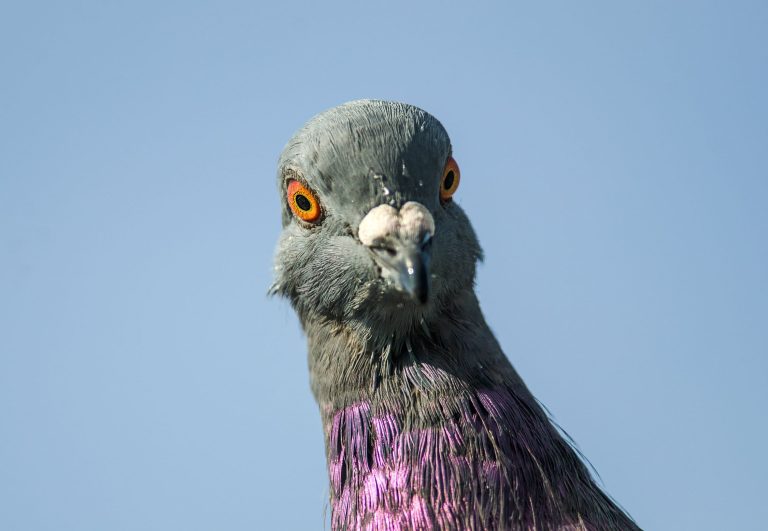What Diseases Do Pigeons Carry?
Pigeons can carry diseases such as histoplasmosis, cryptococcosis, and psittacosis. These diseases spread through their droppings, which can contaminate air and surfaces. People can get infected by inhaling dust with dried droppings or handling contaminated materials. It’s important to manage pigeon populations and clean areas where they roost to reduce risk.
Today, we talk about what diseases can pigeons carry, including common ones, and how they affect human health. Learn how to prevent and protect against these avian-borne threats.
What Diseases Do Pigeons Carry?
Pigeons can carry and spread several diseases to humans, often through their droppings, feathers, or parasites. Some of the most notable diseases include:
1. Histoplasmosis
Histoplasmosis is caused by inhaling spores of the fungus Histoplasma capsulatum, commonly found in soil contaminated with bird droppings, including those of pigeons. When these spores become airborne, they can be inhaled into the lungs, leading to infection. While many people exposed to histoplasmosis may not develop symptoms. Those with weakened immune systems are at greater risk of developing severe illness.
In mild cases, symptoms may resemble those of the flu, including fever, cough, and fatigue. Severe cases can lead to pneumonia and may require antifungal medication for treatment. Histoplasmosis is especially prevalent in areas with large populations of birds, such as urban areas with significant pigeon populations.
2. Cryptococcosis
Cryptococcosis is another fungal infection that can be transmitted through exposure to pigeon droppings. The fungus responsible, Cryptococcus neoformans, is commonly found in soil enriched with bird droppings, particularly those of pigeons and other birds. Like histoplasmosis, cryptococcosis primarily affects the respiratory system. However, it can also spread to other organs, including the central nervous system.
Symptoms of cryptococcosis may vary depending on the organs involved. But can include respiratory issues, fever, headache, and neurological symptoms such as confusion and stiffness of the neck. Severe cases may require antifungal therapy, and in cases where the central nervous system is affected, treatment may be more prolonged and complex.
3. Psittacosis (Parrot Fever)
Psittacosis, also known as parrot fever, is a bacterial infection caused by the bacterium Chlamydia psittaci. While the name suggests a connection to parrots, this bacterium can also be found in pigeons and other birds. Transmission to humans typically occurs through inhalation of aerosolized particles from bird droppings, feathers, or respiratory secretions.
Symptoms of psittacosis can range from mild respiratory illness to severe pneumonia. Common symptoms include fever, headache, cough, and muscle aches. In some cases, psittacosis can lead to more severe complications, particularly in individuals with weakened immune systems. Antibiotics such as tetracycline or doxycycline are typically used to treat psittacosis.
4. Salmonellosis
Salmonellosis is a bacterial infection caused by various strains of the Salmonella bacterium, commonly found in the intestines of birds, including pigeons. Transmission to humans typically occurs through the ingestion of contaminated food or water. Though contact with pigeon droppings can also lead to infection.
Symptoms of salmonellosis typically include diarrhea, abdominal cramps, fever, and vomiting. While most cases of salmonellosis resolve on their own, severe cases may require antibiotic treatment. Preventive measures such as thorough handwashing and proper food handling can help reduce the risk of salmonellosis transmission.
5. E. coli Infection
Escherichia coli (E. coli) is a type of bacteria commonly found in the intestines of animals, including birds like pigeons. While most strains of E. coli are harmless, some can cause gastrointestinal illness in humans. Transmission to humans typically occurs through ingestion of contaminated food or water, though contact with pigeon droppings can also lead to infection.
Symptoms of E. coli infection may include diarrhea (often bloody), abdominal cramps, nausea, and vomiting. Most cases of E. coli infection resolve on their own without treatment. Severe cases may require medical attention, including fluid replacement and, in some cases, antibiotics.
6. Avian Influenza
Avian influenza, also known as bird flu, is caused by influenza viruses that primarily affect birds but can occasionally infect humans. Pigeons can carry avian influenza viruses, though transmission to humans is rare and typically occurs through close contact with infected birds or their droppings.
Symptoms of avian influenza in humans can range from mild respiratory illness to severe pneumonia and respiratory failure. In rare cases, avian influenza viruses can lead to more severe complications, particularly in individuals with underlying health conditions. While there is no specific treatment for avian influenza, antiviral medications may be used to alleviate symptoms and reduce the severity of illness.
7. West Nile Virus
West Nile virus is a mosquito-borne virus commonly found in birds, including pigeons, which serve as reservoir hosts for the virus. While pigeons themselves may not show symptoms of West Nile virus infection. They can act as amplifying hosts, contributing to the spread of the virus to humans through mosquito vectors.
Symptoms of West Nile virus infection in humans can range from mild flu-like symptoms to more severe neurological illness, including encephalitis and meningitis. While most cases of West Nile virus infection are mild and resolve on their own, severe cases may require supportive care in a hospital setting.
8. Encephalitis
Encephalitis refers to inflammation of the brain, which can be caused by various infectious agents, including viruses transmitted by pigeons. Mosquito-borne viruses such as West Nile virus and Japanese encephalitis virus are examples of pathogens carried by pigeons that can cause encephalitis in humans.
Symptoms of encephalitis may include fever, headache, confusion, seizures, and neurological deficits. Treatment for encephalitis typically involves supportive care to alleviate symptoms, though antiviral medications may be used in cases caused by specific viral pathogens.
9. Newcastle Disease
Newcastle disease is a highly contagious viral infection that primarily affects birds, including pigeons. While pigeons themselves may not show severe symptoms of Newcastle disease, they can serve as carriers of the virus, posing a risk of transmission to other bird species and potentially to humans.
In humans, exposure to the Newcastle disease virus may result in conjunctivitis (pink eye) or mild flu-like symptoms. While human-to-human transmission of Newcastle disease is rare, individuals with close contact with infected birds should take precautions to prevent exposure.
FAQ
Pigeons do not carry rabies. Rabies mainly affects mammals, and pigeons are birds. While pigeons can carry other diseases, rabies is not one of them. So, you don’t need to worry about rabies when dealing with pigeons.
Pigeons do not carry more diseases than rats. While both pigeons and rats can spread diseases to humans, rats are generally more notorious for transmitting various diseases. Pigeons mainly carry fewer diseases and pose a lower risk to human health compared to rats.
Pigeons can harm humans by spreading diseases like histoplasmosis and salmonellosis through their droppings. Their droppings can also damage buildings and monuments. Additionally, pigeons can carry mites and other pests that may cause allergic reactions or skin irritation in some people.
Yes, pigeon feathers can carry diseases. These birds might host parasites or bacteria on their feathers, which can be harmful to humans if they come into contact with them. It’s important to avoid direct contact with pigeon feathers, especially if you have any cuts or open wounds, to reduce the risk of getting sick.







